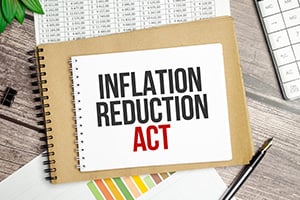By Amritpal Virdee – Senior ESG Consultant
Sustainable Investment Group (SIG)
 In the ever-evolving landscape of sustainability, staying ahead of the curve is paramount. For real estate and infrastructure sectors, the Global Real Estate Sustainability Benchmark (GRESB) has been a guiding light in fostering sustainability. As we step into 2024 and beyond, GRESB is unveiling some significant changes to its methodology to ensure that sustainability reporting remains not just relevant but groundbreaking. In this blog post, we will explore these transformative changes and how they will impact participants in this sustainability journey.
In the ever-evolving landscape of sustainability, staying ahead of the curve is paramount. For real estate and infrastructure sectors, the Global Real Estate Sustainability Benchmark (GRESB) has been a guiding light in fostering sustainability. As we step into 2024 and beyond, GRESB is unveiling some significant changes to its methodology to ensure that sustainability reporting remains not just relevant but groundbreaking. In this blog post, we will explore these transformative changes and how they will impact participants in this sustainability journey.
General 2024 Standard Changes
Climate Resilience and Opportunities (RM5)
Climate change is undeniably one of the most pressing global challenges. GRESB acknowledges this by expanding the scope of indicator RM5 in the 2024 Standard. It now encompasses not only climate-related risks but also climate-related opportunities (CROs). This shift aligns perfectly with the Task Force on Climate-related Financial Disclosures (TCFD) framework, pushing participants to consider the full spectrum of climate scenarios. Participants are now encouraged to weave resilience strategies into their climate planning, addressing both risks and opportunities.
Energy Efficiency Scoring
Efficiency has always been a cornerstone of sustainability, and GRESB is taking it a step further. While energy efficiency scoring won’t directly impact the GRESB Score in 2024, it is a pivotal addition. It lays the foundation for future refinements and integration into the scoring model. By putting a spotlight on energy efficiency, GRESB acknowledges the pivotal role it plays in creating sustainable, resource-efficient real estate assets.
Separating Operational vs. Non-operational Energy Consumption
Data accuracy and clarity are indispensable in sustainability reporting. In a bid to refine energy data reporting, GRESB is introducing a new data input field. This field will allow participants to report non-operational energy consumption separately from operational consumption. This granular approach ensures precise calculation of energy intensity values, thereby promoting data accuracy.
Building Certification Validity and Age
GRESB recognizes the growing importance of building certifications in the sustainability landscape. To that end, the 2024 Standard introduces an expiration year for certifications. This change acknowledges the evolving relevance of certifications over time. It’s a nudge for participants to keep their certifications current and in line with the evolving sustainability landscape.
Tactical 2024 Standard Changes
The tactical review process for the 2024 Standard focuses on streamlining content, reducing reporting burdens, and promoting scoring differentiation. These changes simplify the reporting process and foster more accurate assessments.
ESG Objectives (LE2): Removing the “General sustainability” option from ESG objectives in indicator LE2 streamlines reporting and aligns it more closely with specific ESG goals.
Senior Decision Maker (LE5): By removing the option to report “Fund/Portfolio manager” as a senior decision maker in indicator LE5, GRESB avoids double counting with indicator LE3, ensuring a more precise assessment of senior roles.
Personnel ESG Performance Targets (LE6): To maintain a stricter focus on performance targets, non-financial consequences are no longer rewarded in indicator LE6.
ESG Reporting (RP1): Streamlining reporting, the removal of the option to report through a “Section in entity reporting to investors” in indicator RP1 reduces overlap and reporting burden.
ESG Incident Monitoring (RP2.1): By introducing a scoring weight to encourage the monitoring of controversies and misconduct, GRESB emphasizes the importance of transparent reporting.
Environmental Management System (RM1): With a revised scoring allocation, GRESB acknowledges the significance of Environmental Management Systems (EMS) aligned or certified with a standard.
Net Zero Targets (T1.2): The introduction of a scoring weight for indicator T1.2 encourages the industry to set Net Zero targets, a critical element of a comprehensive Net Zero strategy.
2025 Standard Change
Looking ahead to 2025, GRESB is making changes to employee safety indicators (SE4). Participants must select all four indicators within SE4 to receive full points, promoting comprehensive monitoring of safety indicators. This change underscores the importance of an all-encompassing approach to safety.
Other Changes
While not directly impacting the GRESB Standard, these changes aim to enhance reporting mechanisms and benchmarking methodologies:
New Reporting Scenarios Facilitation for Large Residential Portfolios: GRESB recognizes the need to better accommodate residential real estate. These changes will enable effective reporting for large residential portfolios, aligning with GRESB’s longer-term plan for Residential Real Estate.
Introduction of Country in Benchmarking Methodology: Incorporating “Country” as a geography factor for performance metrics, enhancing benchmarking relevance. It reflects the influence of geographic factors on sustainability performance.
Representativeness of Intensity Values: By lowering the threshold for Data Coverage to > 50%, GRESB aims to enhance portfolio representativeness of intensity values in the GRESB output, providing participants with more insightful data.
These changes underscore GRESB’s commitment to staying at the forefront of sustainability reporting. In a world where sustainability is no longer a choice but a necessity, GRESB’s evolving methodology ensures that participants can continue their journey toward a more sustainable and responsible future.
As the sustainability landscape continues to evolve, GRESB’s efforts to enhance its reporting standards play a pivotal role in promoting transparency, accountability, and sustainability in the industry. Participants are encouraged to stay informed and adapt to these changes to keep their sustainability strategies aligned with the latest industry trends and best practices.
Sustainable Investment Group is here to support all of your ESG needs, including ESG Strategy and ESG Reporting. For more information, contact Amy D’Angelo, Director of ESG, at amyd@sigearth.com.
© 2023 Sustainable Investment Group (SIG). All rights reserved.



